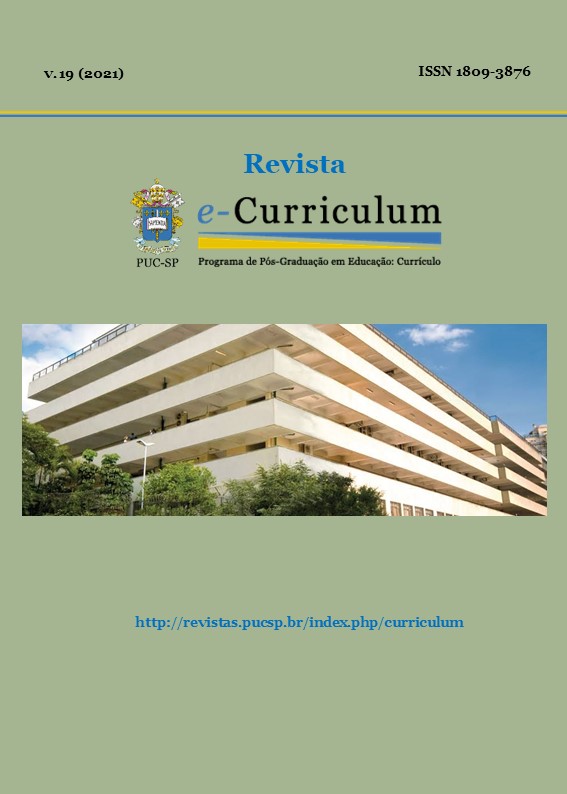Building digital citizens
“Safeweb” curriculum proposal for children and young people in Portugal
DOI:
https://doi.org/10.23925/1809-3876.2021v19i4p1567-1581Keywords:
Digital literacy, Informal learning, Curriculum proposalAbstract
This article presents the development and validation of a curriculum proposal in Digital Literacy, in the context of a pilot project in Branca (Portugal). The SafeWeb project aimed to develop the digital literacy of children and young people between 6 and 16 years old through extracurricular training workshops and also for parents and other educational agents. The plans for each workshop were validated by the PROBRANCA team and the ccTIC UA. These plans were partially co-constructed with the students as the initial planning was adapted to the students' needs. As a final product it was possible to develop a Guiding Guide that could be applied in other contexts.
References
BERS, Marina Umaschi; SEDDIGHIN, Safoura; SULLIVAN, Amanda. Ready for Robotics: bringing together the T and E of STEM in Early Childhood Teacher Education. Jl. of Technology and Teacher Education, v. 21, n. 3, p. 355-377, 2013. Disponível em: https://www.learntechlib.org/p/41987/. Acesso em: 13 set. 2021.
COUTINHO, Clara; LISBÔA, Eliana. Sociedade da informação, do conhecimento e da aprendizagem: desafios para educação no século XXI. Revista de Educação, v. 18, n. 1, p. 5-22. 2011. Disponível em: http://repositorium.sdum.uminho.pt/bitstream/1822/14854/1/Revista_Educa%c3%a7%c3%a3o%2cVolXVIII%2cn%c2%ba1_5-22.pdf. Acesso em: 13 set. 2021.
GUERRA, Cecília; MOREIRA, Filipe T.; LOUREIRO, Maria José; CABRITA, Isabel. Programação tangível para a inclusão e promoção das STEM. APEduC Revista, p. 100-114, 2020. Disponível em https://apeducrevista.utad.pt/index.php/apeduc/article/view/13/7. Acesso em: 13 set. 2021.
HELSPER, Ellen J. The digital disconnect. London: Sage, 2021.
KIVUNJA, Charles. Teaching students to learn and to work well with 21st century skills: unpacking the career and life skills domain of the new learning paradigm. International Journal of Higher Education, v. 4, n. 1, p. 1-11, 2014. Disponível em: https://files.eric.ed.gov/fulltext/EJ1060566.pdf. Acesso em: 13 set. 2021.
MARTINS, Guilherme; GOMES, Carlos; BROCARDO, Joana et al. Perfil dos alunos à saída da escolaridade obrigatória. 2017. Disponível em: https://www.dge.mec.pt/sites/default/files/Curriculo/Projeto_Autonomia_e_Flexibilidade/perfil_dos_alunos.pdf. Acesso em: 13 set. 2021.
MOREIRA, Filipe T. A Internet das Coisas em contextos de educação: tecnologias, potencialidades, desafios e mudanças de paradigmas. 2021. Tese (Doutorado em Multimédia em Educação) – Universidade de Aveiro, Aveiro, 2021.
MOREIRA, Filipe T.; LOUREIRO, Maria João; CABRITA, Isabel. Programação tangível: um robot português num projeto formativo (trans)nacional. In: BOTTENTUIT JUNIOR, João Batista; PIEDADE, João Manuel Nunes; WUNSCH, Luana Priscila; MEDEIROS, Luciano Frontino de (org.). Formação no contexto do pensamento computacional, da robótica e da inteligência artificial. São Luís: EDUFMA, 2020. p. 126-147.
PESTANA, Natália; MOREIRA, Filipe T.; LOUREIRO, Maria José et al. SafeWeb: um projeto-piloto em Portugal. In: VIII SEMINÁRIO NACIONAL INVESTIGANDO PRÁTICAS DE ENSINO (SNIPE) E VI SEMINÁRIO INTERNACIONAL DE PRÁTICAS PEDAGÓGICAS INOVADORAS (SIPPI). Anais 2020. Disponível em: https://seminariosnipe.com.br. Acesso em: 13 set. 2021.
UNICEF. The state of the world’s children: children in a digital world. New York, 2017. Disponível em: https://www.unicef.org/media/48601/file/SOWC_2017_Summary_ENG.pdf. Acesso em: 28 nov. 2021.
UN – UNITED NATIONS. Transforming our world: the 2030 agenda for sustainable development. New York, 2015 Disponível em: https://sdgs.un.org/publications/transforming-our-world-2030-agenda-sustainable-development-17981. Acesso em: 28 nov. 2021.
Downloads
Published
How to Cite
Issue
Section
License
Copyright (c) 2021 Revista e-Curriculum

This work is licensed under a Creative Commons Attribution 4.0 International License.
Os autores concedem à revista todos os direitos autorais referentes aos trabalhos publicados. Os conceitos emitidos em artigos assinados são de absoluta e exclusiva responsabilidade de seus autores.Todo o conteúdo da Revista e-Curriculum é aberto para acesso público, propiciando maior visibilidade, alcance e disseminação dos trabalhos publicados.











